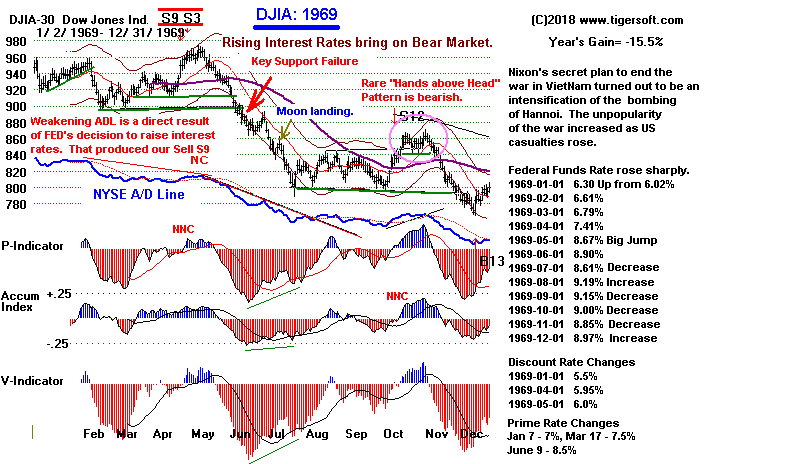Peerless Charts -
1960s
Peerless Stock Market Timing: 1915-2015
Explosive Super Stocks
Killer Short Sales
Tiger Tahiti System
Tiger Closing Power
Example Detecting and Profiting from
Pump and Dump Schemes: 2013-2014 ARWR
William Schmidt, Ph.D. (Columbia Univ.)
---------------------------------------------------------------------------------------------------------------------------
In his Innaugural
Address in January 1961, the soon-to-be-martyred President Kennedy asked his
countrymen to be less selfish
and serve their country more eagerly. His rhetoric resounded with young voters,
some of whom joined his new
creation, the Peace Corps. But he made fierce enemies on Wall Street in
April 1962 when he was quoted
as saying: "My father always told me that all businessmen were sons of bitches,
but I never believed it until
now." US Steel had just double-crossed him by raising its prices right after
the
President had gotten labor to
pause in seeking higher wages.
( https://www.theatlantic.com/magazine/archive/2013/08/those-sobs/309478/
)
It was at this point, Wall
Street decided to show the young President who was really in charge. Stock prices
were dropped sharply.
The DJI fell from 700 to 540, more than 22% in ten weeks . At this point, Kennedy
surrendered, just as Teddy
Roosevelt did to JP Morgan in the 1907 Panic In June, Kennedy announced to
Yale's graduating class, and
I was in the audience, that he would soon be sharply lowering taxes on the rich
and on corporations, very
much like Republican Presidents Harding and Coolidge had in the 1920s and later
Reagan and Trump would years
later. Kennedy maintained that he wanted to spur on a weak economy.
But with this, Wall Street
knew it had won its war with the President. This was exactly the concession that
Wall Street wanted.
Even October's very real threat of a nuclear war with the USSR over the Cuban missiles
did not drop the DJI to new
lows that Fall. And when the Crisis was over, the stock market turned very bullish
for the next three years.
Besides, switching to
Republican "supply-side" economics, the President whole-heartedly endorsed
military
spending. It is
forgotten that under Kennedy numerous nuclear weapons and ICBM missiles were hastily built
and deployed in silos and
submarines, even though by this time, in 1962, it was realized that there was no
"missile gap".
Kennedy considered nuclear weapons essential to deter the Soviets in Berlin
and even
authorized plans for a
"first strike". Before signing a nuclear test-ban in 1963, he made sure
that the US had
finished conducting a round
of underground tests in Nevada.
( https://en.wikipedia.org/wiki/Missile_gap
)
The "icing on the cake"
for the military was JFK's pledge to put Americans on the moon by the end of the
decade. All this spending set
off a boom to makers of computers, rockets and miniaturized circuitry. It also
allowed Japan and Germany to
focus on US consumer markets for electronics and cars without fear that
the US Government would
interfere.
The tax cuts and all this new
spending on the military had the desired effects of enriching the middle class,
lifting Wall Street and lowering
aggregate unemployment. "During that tax-cut-fueled economic expansion
in the 1960s, real GDP growth
averaged 5%, with growth as high as 8.5% in two quarters. US payrolls increased
by 32% during the 1960s, the
highest growth in jobs by far of any decade during the postwar period."
( https://www.aei.org/carpe-diem/lets-not-forget-the-decade-the-liberals-love-to-hate-the-1960s-and-president-kennedys-successful-supply-side-tax-cuts/
)
But they also created a certain
hubris, over-confidence and arrogance among the advisors to President
Lyndon Johnson. His leading
technocrats came to feel the US was militarily invincible. They became too
confident that US military prowess
could defeat any enemy, even one determined to fight a national liberation
war for years if necessary on its
turf, in the jungles of Viet Nam. And what was worse? LBJ also believed that
he could successfully fight both an
increasinly unpopular and deadly foreign war and a domestic war on poverty,
with all its frustrations, tensions
and deeply rooted causes.
Like most Presidents before him,
LBJ refused to raise taxes to fight his two wars. Inflation resulted and
the FED quite naturally raised
interest rates in 1966 until it caused a bear market in the blue chips. It was
at that point that the FED relented
and began lowering interest rates. This "juiced the stock market".
1967 was the year that every stock
with the named "Computer" or "Data" went wild to the upside.
( Read The Money Game, by George Goodman https://www.amazon.com/Money-Game-Adam-Smith/dp/0394721039
)
In the Fall of 1967, the FED again
decided to raise interest rates. But it did so only half-heartedly. The
speculative furies were not purged.
When LBJ announced in March 1968 that he would not run again
for President, hopes for peace
broke cover and thousands of small investors rushed again to buy stocks.
This time it was the "cats and
dogs", the secondary stocks, that shot up wildly.
Only after the 1968 Presidential
Election took place, and the FED could not be challenged as favoring
either the Democrats or the
Republicans, as the Republican Nixon had accused them of doing in 1960,
did the Fed finally decide with
raise interest rates to break the speculative bubble in the stock market
that was fueling an unacceptibly
high rate of inflation.
1959-1960
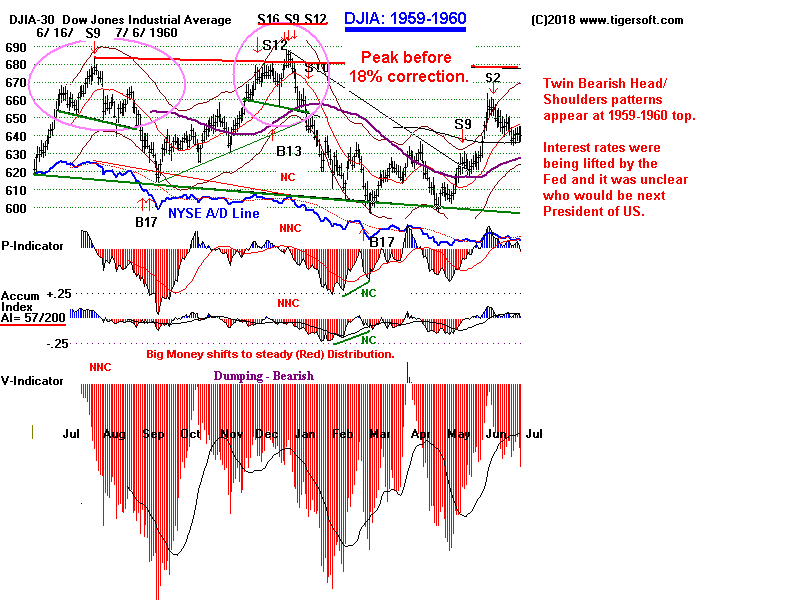
1960
Events:
January 24 – A major insurrection occurs in Algiers against French
colonial policy.
February 1
– Greensboro sit-ins: In Greensboro, North Carolina, four black students
from North
Carolina Agricultural and Technical State University begin a sit-in at a segregated Woolworth's lunch counter.
Although they are refused service, they are allowed to stay at the counter. The event
triggers many similar non-violent protests throughout the Southern
United States, and six months later, the original four protesters are served lunch at
the same counter.
February 9
- Adolph
Coors III, the chairman of the board of the Coors Brewing Company, is kidnapped in the
United States,
and his captors demand a ransom of $500,000. Coors is later found murdered, and Joseph Corbett, Jr. is
indicted for the crime.
February 13 – France tests its first atomic bomb, in the Sahara Desert of Algeria.
March 6
- Vietnam War:
The United States announces that 3,500 American soldiers will be sent as advisors to Vietnam.
March 22 – Arthur Leonard Schawlow and Charles Hard Townes receive the first patent for a laser, in the United States.
May 1
May 3
May 6 – United States President Dwight
D. Eisenhower signs the Civil Rights Act of 1960 into law.
May 10 – The U.S. nuclear-powered submarine USS Triton
completes the first underwater circumnavigation
of the Earth.
May 16
- Soviet Premier Nikita Khrushchev demands an apology from Eisenhower for the U-2
reconnaissance plane flights
over the Soviet Union, thus aborting the summit meeting scheduled for Paris in 1960.
June 7 – U.S. Senator John F. Kennedy wins the California Democratic primary.
July 1
Cold War: A Soviet Air Force MiG-19 fighter plane flying north of Murmansk, Russia,
over the Barents Sea, shoots down a six-man RB-47 Stratojet reconnaissance plane of the
U.S. Air Force. Four of the U.S. Air Force officers are killed, and the two survivors are
held prisoner in the Soviet Union.
July 13 – U.S. Senator John F. Kennedy is nominated for President of the
United States at the 1960 Democratic National Convention in Los Angeles.
July 25 – The Woolworth Company's lunch counter in Greensboro, North Carolina,
the location of a sit-in that has sparked demonstrations by Negroes across the Southern
United States, serves a meal to its first black customer.
July 25–28 – In Chicago, the 1960 Republican National Convention
nominates Vice President Richard Nixon as its candidate for President of the United
States, and Henry Cabot Lodge Jr., as its candidate to become the new vice-president.
August 6
- Cuban Revolution: In response to a United States embargo against Cuba, Fidel Castro
nationalizes all American and foreign-owned property in Cuba.
August 7
The Ivory Coast becomes
independent from France.
August 18 – United States president Dwight Eisenhower is briefed on the Congo crisis
at a meeting with the U.S. National Security Council, and asks
whether the U.S. "can't get rid of this guy" (Patrice
Lumumba).
August 19
- Cold War: In
Moscow, American U-2 pilot Francis Gary Powers is sentenced to 10 years in prison for espionage.
September 6
– William Hamilton Martin and Bernon F. Mitchell,
two American cryptologists, announce their defection
to the Soviet Union at a press conference in Moscow.
September 21 — Mexican President Adolfo
López Mateos nationalizes the country's electrical system.
September 26 – The leading candidates for President of the United States,
Richard Nixon and John F. Kennedy, participate in the first televised debate.
October 12 -
November 8
– 1960 United States presidential election:
In a close race, Democratic U. S. Senator John F.
Kennedy is elected over Republican U. S. Vice President Richard Nixon,
to become (at 43) the second youngest man to serve as President of the United States, and
the youngest man elected to this position.
November 22
– The United Nations supports the government of Joseph Kasavubu and Joseph Mobutu,
in the Republic of the Congo.
December 1
December 7
– The United Nations Security Council is called into
session by the Soviet
Union, in order to consider Soviet demands for the Security Council to seek the
immediate release of former Congolese Premier Patrice
Lumumba.
December 9
- French President Charles de Gaulle's visit to Algeria is bloodied by
European and Muslim rioters,
in Algeria's largest cities. These riots cause 127 deaths.
December 12
– The Supreme Court of the United States upholds
a lower Federal Court ruling
that the State of Louisiana's
racial segregation laws
are unconstitutional,
and overturns them.
December 14
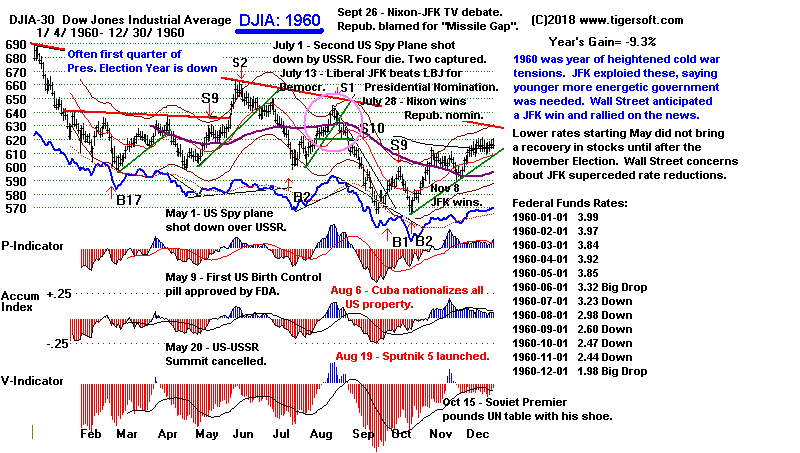
1960-1961
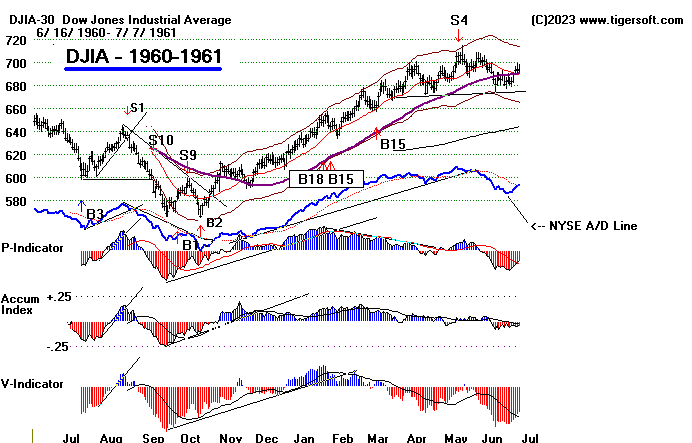
1961
January 3
January 8
– In France, a referendum
supports Charles de Gaulle's policies on independence for Algeria.
January 9
– British authorities announce they have uncovered a large Soviet spy ring, the Portland
Spy Ring, in London.
February 4
– The Portuguese Colonial War begins in Angola.February 15
March 13 - United States President John F.
Kennedy proposes a long-term "Alliance
for Progress", between the United States and Latin America.[6]
March 13-
A second B-52
crashes near Yuba
City, California, after cabin pressure is lost and the fuel runs out.
Two nuclear
weapons are found unexploded.
April 12
April 17
April 22 – Algiers putsch: Four French generals who
oppose de
Gaulle's policies in Algeria
fail in a coup
attempt.
April 27
- President Kennedy urges newspapers to consider national interest in
times of struggle against "a monolithic and ruthless conspiracy", in an address
before the American Newspaper Publishers Association.[9]
May 14 – Civil rights movement: A Freedom Riders
bus is fire-bombed near Anniston, Alabama, and the civil rights protestors are
beaten by an angry mob of Ku Klux Klan members.
May 24 – Civil rights movement: Freedom Riders
are arrested in Jackson, Mississippi for "disturbing the
peace", after disembarking from their bus.
May 25 – Apollo program: President
Kennedy announces, before a special joint session of Congress, his goal to put a man
on the Moon before the end of the decade.
May 30 – Rafael Leónidas Trujillo,
totalitarian despot of the Dominican Republic since 1930, is killed in an ambush,
putting an end to the second longest-running dictatorship in Latin American history.
June 4 – Vienna summit: John F.
Kennedy and Nikita Khrushchev meet during two days in Vienna. They discuss
nuclear tests, disarmament
and Germany.
june 17 - The New Democratic Party of Canada is founded, with the
merger of the Cooperative Commonwealth
Federation (CCF) and the Canadian Labour Congress.
July 25 – U.S. President John F.
Kennedy gives a widely watched TV speech on the Berlin crisis, warning "we will
not be driven out of Berlin." Kennedy urges Americans to build fallout shelters,
setting off a four-month debate on civil defense.
August 6 – Vostok 2: Soviet cosmonaut Gherman Titov
becomes the second human to orbit the Earth, and the first to be in outer space for more
than one day.
August 13 – Construction of the Berlin Wall
begins, restricting movement between East Berlin and West Berlin, and
forming a clear boundary between West Germany and East Germany, Western Europe
and Eastern
Europe.
October 17 – Paris massacre of 1961: French police in Paris attack
about 30,000 protesting a curfew applied solely to Algerians. The official
death toll is 3, but human rights groups claim 240 dead.
October 30
Oct 31 -
Joseph Stalin's body is removed from the Lenin Mausoleum.
November 18 – U.S. President John F.
Kennedy sends 18,000 military advisors to South Vietnam.
November 28 -
On November 28, 1961, President Kennedy halted sales of silver by the Treasury Department.
Increasing demand for silver as an industrial metal had led to an increase in the market
price of silver above the United States government's fixed price. This led to a decline in
the government's excess silver reserves by over 80% during 1961. Kennedy also called upon
Congress to phase out silver certificates in favor of Federal Reserve notes
December 2 – Cold
War: In a nationally broadcast speech, Cuban leader Fidel Castro announces he is a Marxist–Leninist, and that Cuba will adopt socialism.
December 11
- American involvement in the Vietnam War officially begins, as the first American helicopters
arrive in Saigon, along with 400 U.S. personnel.
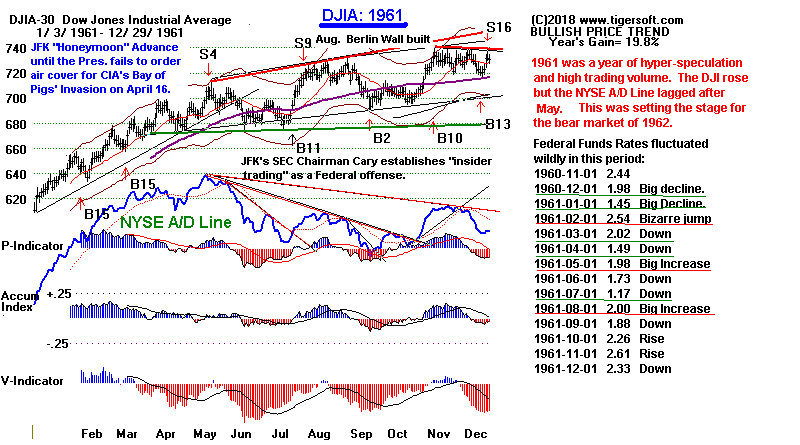
1961-1962
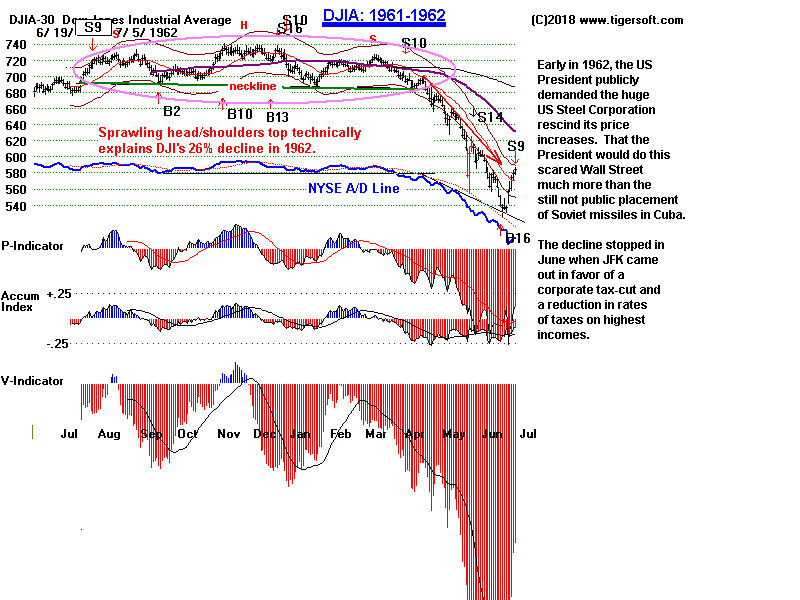
1962
February 3 – The United States embargo against Cuba is
announced.
February 6 – Negotiations between U.S. Steel and the United States Department of Commerce
begin.
February 7 – The United States Government bans all U.S.-related Cuban imports and exports.
February 20 – Project Mercury: while aboard Friendship 7, John Glenn becomes
the first American to orbit the Earth, three times in 4 hours, 55 minutes.
March 26 – Baker v. Carr: the U.S. Supreme Court rules that federal courts can order
state legislatures to reapportion seats.
- April 6 -
The United Steel Workers of America and steel manufacturers agreed to a new contract,
brokered by the U.S. Department of Labor, in which the union reduced its demands for a
wage increase from 17 cents to 10 cents an hour, based upon the White House's
determination to hold down prices. Four days later, the steel makers raised their prices
anyway.
April 13 - Calling its executives "bastards", JFK forces US Steel to roll
back its increase in steel prices.
https://peoplesworld.org/article/how-jfk-forced-steel-price-roll-back/
October 14 – Cuban Missile Crisis begins: a U-2 flight over Cuba takes photos of Soviet nuclear weapons
being installed. A stand-off then ensues the next day between the United States and the Soviet Union,
threatening the world with nuclear war.
October 22 – In a televised address, U.S. President John F.
Kennedy announces to the nation the existence of Soviet missiles
in Cuba.
October 28 – Cuban Missile Crisis: Soviet Union
leader Nikita
Khrushchev announces that he has ordered the removal of Soviet missile bases in Cuba. In a secret deal between Kennedy
and Khrushchev, Kennedy agrees to the withdrawal of U.S. missiles from Turkey. The fact
that this deal is not made public makes it look like the Soviets have backed down.
December 2 – Vietnam War: after a trip to Vietnam at the request of
U.S. President John F. Kennedy, U.S. Senate Majority Leader Mike Mansfield
becomes the first American official to make a non-optimistic public comment on the war's
progress.
December 8 – The 1962 New York City
newspaper strike begins, affecting all of the city's major newspapers; it lasts for
114 days.
December 24 – Cuba
releases the last 1,113 participants in the Bay
of Pigs Invasion to the U.S., in exchange for food worth $53 million.
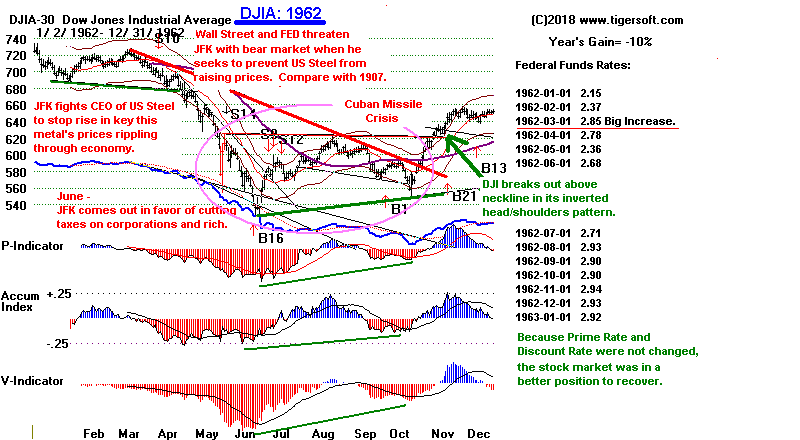
1962-1963
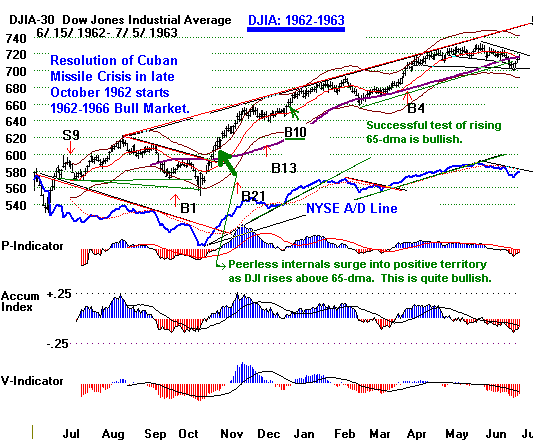
1963
March 18 – Gideon v. Wainwright: The Supreme Court of the United States rules
that state courts are required to provide counsel in criminal cases for defendants who
cannot afford to pay their own attorneys.
April 10 – The U.S. nuclear submarine Thresher
sinks 220 mi (190 nmi; 350 km) east of Cape Cod; all 129
aboard (112 crewmen plus yard personnel) die.
April 12
May 2
- Thousands of black people, many of them children, are arrested while protesting
segregation in Birmingham, Alabama. Public Safety Commissioner Eugene
"Bull" Connor later unleashes fire hoses and police dogs on the
demonstrators.
May 8 – Hu? Ph?t Ð?n shootings: The Army of the Republic of Vietnam opens fire on
Buddhists who defy a ban on the flying of the Buddhist flag
on Vesak, the birthday of Gautama Buddha,
killing 9
May 23 – Fidel Castro visits the Soviet Union.
June 3 – Hu? chemical attacks: The Army of the Republic of Vietnam rains liquid chemicals
on the heads of Buddhist protestors, injuring 67 people. The United States threatens to
cut off aid to the regime of Ngô Ðình Di?m.
June 4 – President of the United States John F.
Kennedy signs Executive Order 11110, authorizing the Secretary of the Treasury to continue issuing silver certificates.
June - 11 - In Saigon, Buddhist monk Thích
Qu?ng Ð?c commits self-immolation to protest the oppression of Buddhists by the Ngô Ðình Di?m administration.
President John F. Kennedy broadcasts a historic Civil Rights Address in which he promises a Civil Rights
Bill and asks for "the kind of equality of treatment that we would want for
ourselves".
June 12
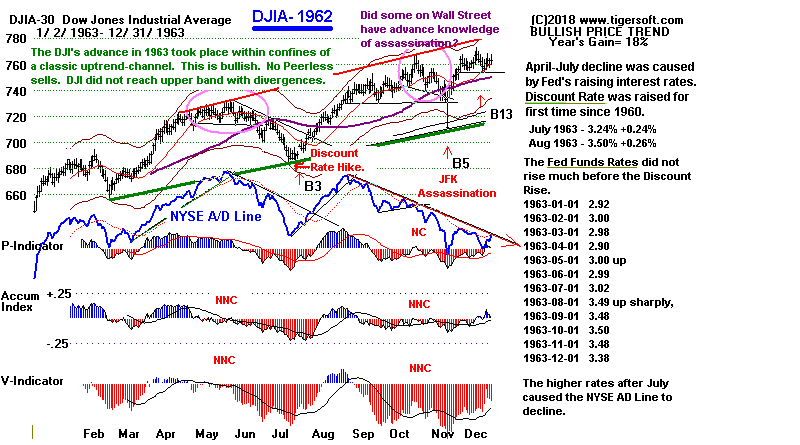
1963-1964
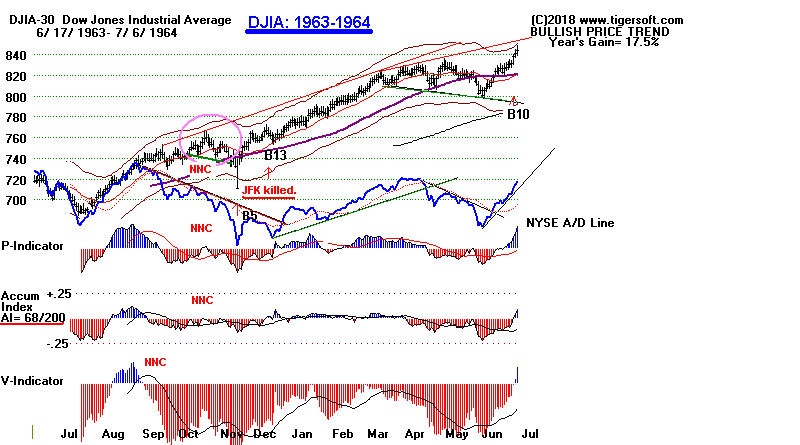
1964
- January 6 –
A British firm, the Leyland Motor Corp., announces the sale of 450 buses to the
Cuban government, challenging the United States blockade of Cuba.[2]
- January 9 –
Martyrs' Day: Armed clashes between United States
troops and Panamanian civilians in the Panama
Canal Zone precipitate a major international crisis, resulting in the deaths of 21
Panamanians and 4 U.S. soldiers.
- January 11
– United States Surgeon General
Luther Terry
reports that smoking may be hazardous to one's health (the first such statement from the
U.S. government).[3]
-
- jan 15 - The Teamsters union negotiates the first national
labor contract in the United States.[5]
-
January 30
– General Nguy?n
Khánh leads a bloodless military coup d'état, replacing Duong Van Minh
as Prime Minister of South Vietnam.
February 6 – Cuba
cuts off the normal water supply to the United States Guantanamo Bay Naval Base, in reprisal for the U.S.
seizure 4 days earlier of 4 Cuban fishing boats off the coast of Florida.
February 7
- An all-white jury in Jackson, Mississippi, United States, trying Byron
De La Beckwith for the murder of Medgar Evers in June 1963, reports that it cannot reach a verdict, resulting in a mistrial.[13]
-
February 9 – The Beatles appear on The
Ed Sullivan Show, marking their first live performance on American television.
Seen by an estimated 73,000,000 viewers, the appearance becomes the catalyst for the
mid-1960s "British Invasion" of American popular music.
February 29 – U.S. President Lyndon B.
Johnson announces that the United States has developed a jet airplane (the A-11),
capable of sustained flight at more than 2,000 miles per hour (3,200 km/h) and of
altitudes of more than 70,000 feet (21,000 m).
March 9
The first Ford
Mustang is manufactured, by the Ford
Motor Company, in Dearborn, Michigan, United States.[24]
March 10
- Soviet
military forces shoot down an unarmed reconnaissance bomber that had strayed into East Germany;
the 3 U.S. flyers parachute to safety.
January 23
Kennedy signed the bill into law on June 4, 1963, and on the same day signed an executive
order (11110) authorizing the Treasury Secretary to continue printing silver certificates
during the transition period.[11][12]
The act, which became Public Law 88-36 (77 Stat. 54), repealed the Silver Purchase Act of
1934 and related laws, repealed a tax on silver transfers, and authorized the Federal
Reserve to issue one- and two-dollar bills, in addition to the notes they were already
issuing.[13]
The Silver Purchase Act had authorized and required the Secretary of the Treasury to buy
silver and issue silver certificates.
Executive Order 11110 was an effort by Kennedy to transfer
power from the Federal Reserve to the United States Department of the Treasury by
replacing Federal Reserve Notes with silver certificates.
https://foundationfortruthinlaw.org/jfk-vs-fed.html
March 26 – U.S. Defense Secretary Robert
McNamara delivers an address that reiterates American determination to give South
Vietnam increased military and economic aid, in its war against the Communist
insurgency.
March 30 – Merv Griffin's game show Jeopardy! debuts
on NBC;
March 31
– The military overthrows Brazilian
President João
Goulart in a coup, starting 21 years of
dictatorship in Brazil. It
ends in 1985.
April 7 – IBM
announces the System/360.
April 8
- Four of 5 railroad operating unions in the United States strike against the Illinois Central
Railroad without warning, bringing to a head a 5-year dispute over railroad work rules.
April 19 – In Laos,
the coalition government of Prince Souvanna Phouma is deposed by a right-wing military group, led
by Brig. Gen. Kouprasith Abhay. Not supported by the United States, the
coup is ultimately unsuccessful, and Souvanna Phouma is reinstated, remaining as Prime
Minister until 1975.
April 20
May 1 – At 4:00 a.m., John George Kemeny and Thomas Eugene Kurtz run the first computer program written
in BASIC (Beginners' All-purpose Symbolic Instruction
Code), an easy to learn high level programming
language which they have created.[34] BASIC is eventually
included on many computers
and even some games consoles.
may 2 Some 400–1,000 students march through Times Square,
New York, and another 700 in San Francisco, in the first major student demonstration against
the Vietnam War. Smaller marches also occur in Boston, Seattle, and Madison, WI.
United States Senator Barry Goldwater receives more than 75% of the votes in the Texas Republican presidential
primary.
may 2
Henry Hezekiah Dee and Charles Eddie Moore, hitchhiking in Meadville,
Mississippi, are kidnapped, beaten, murdered by members of the Ku Klux Klan.
Their badly decomposed
bodies are found by chance in July during the search for missing activists Chaney, Goodman, and
Schwerner.
May 2
May 12 – Twelve young men in New York City publicly burn
their draft cards to protest the Vietnam War; the first such act of war resistance.
May 24 – 25
– The crowd at a football match in Lima, Peru riots over a referee's decision in the Peru-Argentina game; 319
are killed, 500 injured.
June 2
June 10
june 12
June 21
July 2 – President Lyndon Johnson signs the Civil Rights Act of 1964 into law, officially
abolishing racial segregation in the United States.
July 18
- Six days of race riots begin in Harlem, New York, United States, apparently prompted by the shooting of
a teenager.[46]
August 5
October 14 – American civil rights movement leader Martin
Luther King Jr. becomes the youngest recipient of the Nobel
Peace Prize, which is awarded to him for leading non-violent resistance to end racial prejudice in the
United States.
October 14 – 15 – Nikita Khrushchev is deposed as leader of the Soviet Union; Leonid
Brezhnev and Alexei Kosygin assume power.
October 27 – In the Democratic Republic of the Congo, rebel
leader Christopher Gbenye takes 60 Americans and 800 Belgians hostage.
November 1 – Mortar fire from North Vietnamese forces rains on the Bien Hoa
Air Base, killing four U.S. servicemen, wounding 72, and destroying five B-57 jet bombers and other planes.
November 3
mov 3 -- The Bolivian
government of President Víctor Paz Estenssoro is overthrown by a military
rebellion led by General Alfredo Ovando Candía, commander-in-chief of the armed
forces.
nov 21 - The Verrazano-Narrows Bridge across New York Bay
opens to traffic (the world's longest suspension
bridge at this time).[68]
nov 28
Vietnam War: United States National Security Council
members, including Robert McNamara, Dean Rusk, and Maxwell Taylor, agree to recommend a plan for a 2-stage
escalation of bombing in North Vietnam, to President Lyndon B.
Johnson.
December 3
- Berkeley Free Speech Movement:
Police arrest about 800 students at the University of California, Berkeley,
following their takeover of and massive sit-in at the Sproul Hall administration building.
The sit-in most directly protested the U.C. Regents' decision to punish student activists
for what many thought had been justified civil disobedience earlier in the conflict.[69]
December 11 – Che Guevara addresses the United Nations General Assembly.[72]
December 14 – Heart of Atlanta Motel
v. United States (379 US 241 1964): The U.S. Supreme Court rules that, in
accordance with the Civil Rights Act of 1964, establishments providing
public accommodation must refrain from racial discrimination.
December 18
- In the wake of deadly riots in January over control of the Panama Canal,
the U.S. offers to negotiate a new canal treaty.
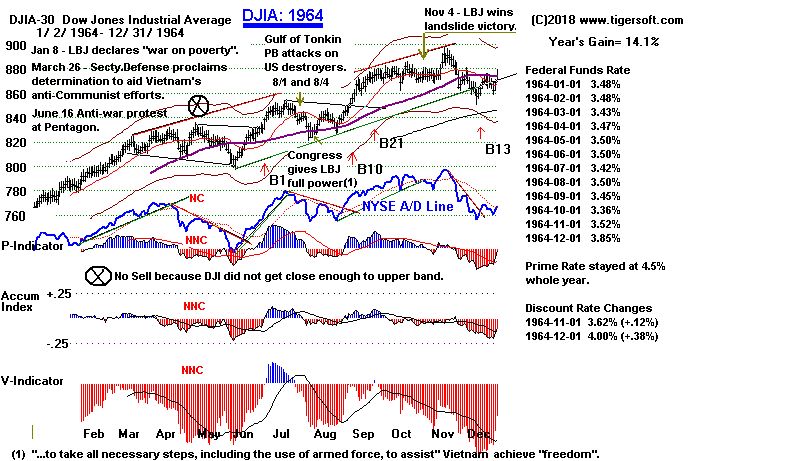
1964-1965
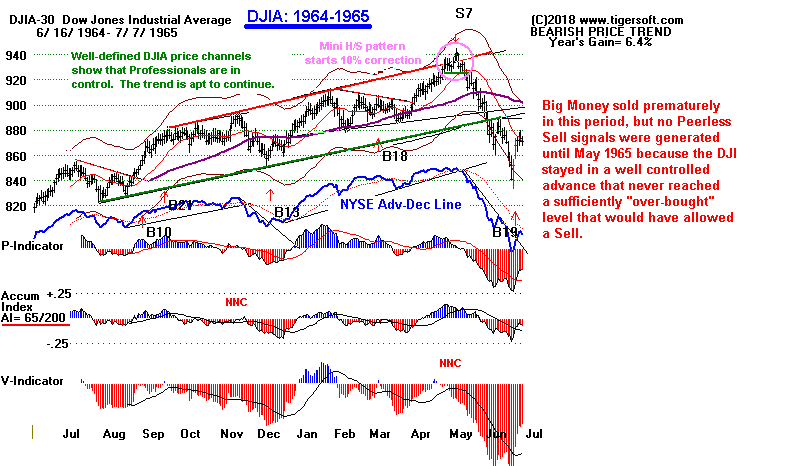
1965
February 21 – African-American Muslim minister and human rights activist Malcolm X is assassinated in New York City.
March 2
March 11 – White Unitarian Universalist minister James J. Reeb, beaten by White supremacists in Selma, Alabama,
on March 9 following
"Turnaround Tuesday", dies in a hospital in Birmingham,
Alabama.
March 16
– Police clash with 600 SNCC marchers in Montgomery,
Alabama.
March 17 - In response to the events of March 7 and 9 in Selma, Alabama, President Lyndon
B. Johnson sends a bill to Congress that forms the basis for the Voting Rights Act of 1965. It is passed by the Senate
May 26, the House July 10, and signed into law by Johnson August 6.
March 18 - A United States federal judge rules that SCLC has the lawful right to march to
Montgomery, Alabama, to petition for 'redress of grievances'.
March 20 - The Indo-Pakistani War of 1965 begins.
March 21 -
Martin Luther King Jr. and others lead 3,200 civil
rights activists in the third march from Selma, Alabama, to the capitol in Montgomery.
March 30
- Funeral services are held for Detroit homemaker Viola Liuzzo,
who was shot dead by four Klansmen as she drove marchers back to Selma at night after the
civil rights march.
-
April 6
April 17 – The first Students for a Democratic Society march
against the Vietnam War draws 25,000 protestors to Washington, D.C.
April 24 - In the Dominican Republic, officers and civilians loyal to deposed
President Juan Bosch mutiny against the right-wing junta running
the country, setting up a provisional government. Forces loyal to the deposed
military-imposed government stage a countercoup the next day, and civil war breaks out,
although the new government retains its hold on power.
April 28
- U.S.
troops occupy the Dominican Republic.
-
Vietnam War: Prime Minister of Australia Robert Menzies
announces that the country will substantially increase its number of troops in South Vietnam,
supposedly at the request of the Saigon government (it is later revealed that
Menzies had asked the leadership in Saigon to send the request at the behest of the
Americans).
May 5 – Forty men burn their draft cards at the University of California, Berkeley, and a
coffin is marched to the Berkeley Draft Board.
May 21 – The largest antiwar teach-in to date begins at Berkeley,
California, attended by 30,000.
May 22
- Several hundred Vietnam War protesters in Berkeley, California, march to the Draft Board
again to burn 19 more cards. Lyndon B. Johnson is hung in effigy.
June 10 – Vietnam War – Battle of Dong Xoai: About 1,500 Viet Cong mount a
mortar attack on Ð?ng
Xoài, overrunning its military headquarters and the adjoining militia compound.
June 16 – A planned anti-Vietnam War
protest at The
Pentagon becomes a teach-in, with demonstrators distributing 50,000 leaflets in and
around the building.
June 19 -
Air Marshal Nguyen Cao Ky, head of the South Vietnamese Air Force, was appointed prime minister at
the head of military junta, with General Nguy?n Van
Thi?u becoming a figurehead president, ending two years of short-lived military
juntas.[6]
July 24 – Vietnam War: Four F-4C Phantoms escorting a bombing
raid at Kang Chi are targeted by antiaircraft missiles, in the first such attack against
American planes in the war. One is shot down and the other 3 sustain damage.
July 28 – Vietnam War: U.S. President Lyndon B.
Johnson announces his order to increase the number of United States troops in South Vietnam
from 75,000 to 125,000, and to more than double the number of men drafted per month - from
17,000 to 35,000.
July 30 – War on Poverty: U.S. President Lyndon B.
Johnson signs the Social Security Act of 1965
into law, establishing Medicare and Medicaid.
August 6 – U.S. President Lyndon B.
Johnson signs the Voting Rights Act of 1965 into law, outlawing literacy tests
and other discriminatory voting practices that have been responsible for widespread disfranchisement
of African
Americans.
August 11 – The Watts Riots begin in Los Angeles, ending on
the 16th after resulting in 34 deaths and over 3,000 arrests.
August 18 – Vietnam War – Operation
Starlite: 5,500 United States Marines destroy a Viet Cong stronghold
on the Van Tuong peninsula in Qu?ng Ngãi Province, in the first
major American ground battle of the war. The Marines were tipped off by a Viet Cong
deserter who said that there was an attack planned against the U.S. base at Chu Lai.
August 20 – Jonathan Myrick Daniels, an Episcopal seminarian from Keene,
New Hampshire, is murdered in Hayneville,
Alabama, while working in the civil
rights movement.
August 31 – President Johnson signs a law penalizing the burning of draft
cards with up to 5 years in prison and a $1,000 fine.
September 20 – Vietnam War: An USAF F-104 Starfighter piloted by Captain Philip Eldon Smith is
shot down by a Chinese MiG-19 Farmer. The pilot is held until March 15 1973.
September 28
- Fidel Castro
announces that anyone who wants to can emigrate to the United States.
-
September 30
- The Indonesian
army, led by General Suharto,
crushes an alleged communist coup attempt
-
October 15 – Vietnam War: The Catholic Worker Movement stages an anti-war protest
in Manhattan. One draft card burner is arrested, the first under the new law.
Oct - 16
Anti-war protests draw 100,000 in 80 U.S. cities and around the world
October 27
October 30
oct 30
In Washington, D.C., a pro-Vietnam War march draws 25,000.
November 8
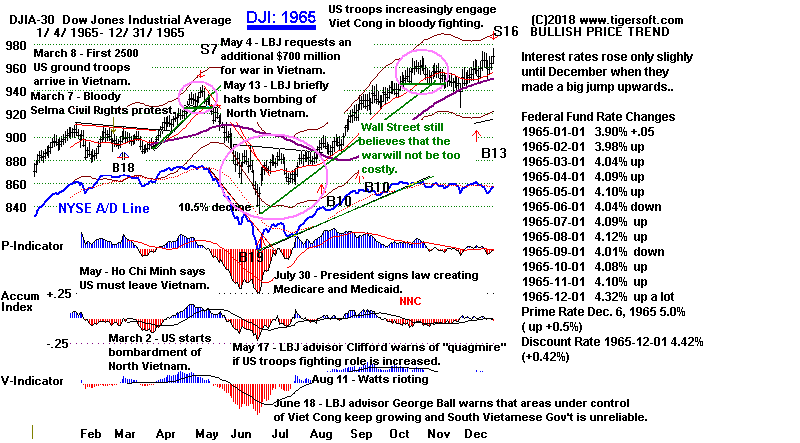
1965-1966
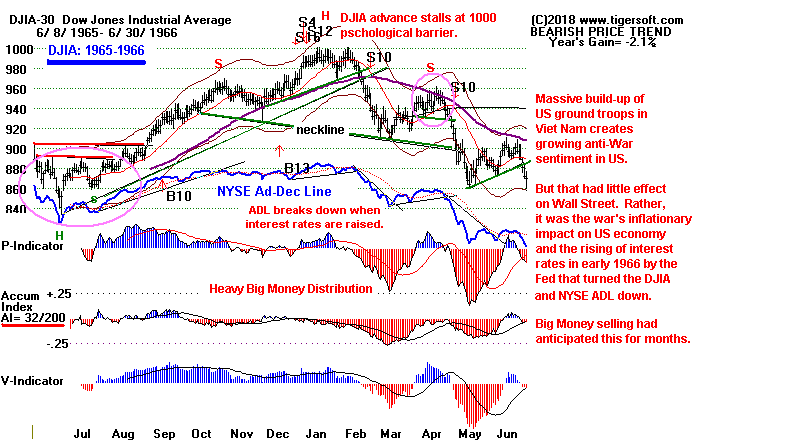
1966
Jan 10 -
Apr 14 - The South Vietnamese government promises free elections in 3–5
months.
April 21
May 28
June 6 – Civil rights activist James Meredith
is shot by a sniper while traversing Mississippi in the March
Against Fear.
JJune 28 - 1966 Topeka tornado: Topeka, Kansas
is devastated by a tornado that registers as an "F5" on the Fujita scale,
the first to exceed US$100 million in damages. Sixteen people are killed, hundreds
more injured and thousands of homes damaged or destroyed, and the campus of Washburn
University suffers catastrophic damage
June 13 – Miranda v. Arizona: The Supreme Court of the United States rules
that the police must inform suspects of their rights before questioning them.
June 29
July 4
July 16 – British Prime Minister Harold Wilson
flies to Moscow to try to start peace negotiations about the Vietnam War (the
Soviet government rejects his ideas).
July 18 - The Hough Riots break out in Cleveland, Ohio, the city's first race riot.
Aug 5 -
September 8 – The classic science fiction series Star Trek premieres on NBC in the United States with its
first episode, titled "The Man Trap"
September 13 – Cultural Revolution in China: Clashes between the Chinese
Communist Party and the Red Guards are reported by TASS in the Soviet
Union.
October – Bobby
Seale and Huey P. Newton found the Black
Panther Party in the United States.
OLct 5 - An experimental breeder reactor at the Enrico Fermi Nuclear Generating Station
in Michigan suffers a partial meltdown when its cooling system fails.
October 7 – The Soviet Union declares that all Chinese students must leave the
country before the end of October.
October 9 – Vietnam War: Binh Tai
Massacre.
October 11 – France and the Soviet Union
sign a treaty for cooperation in nuclear research.
December 6 – Vietnam War: Bình
Hòa massacre.
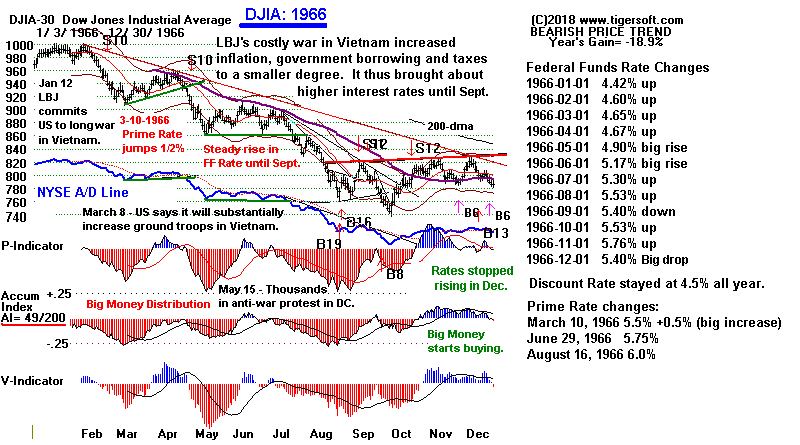
1966-1967
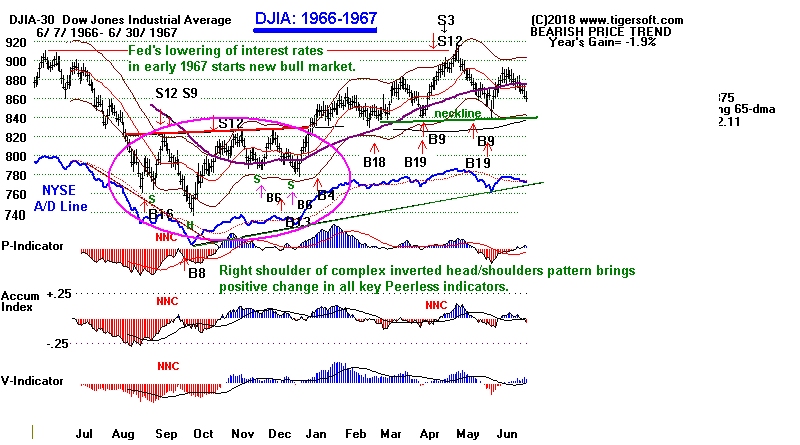
1967
January 27
February 7
- The Chinese government announces that it can no longer guarantee the safety of Soviet
diplomats outside the Soviet Embassy building.
February 15 – The Soviet Union announces that it has sent troops near the Chinese
border.
March 21
Vietnam War:
In ongoing campus unrest, Howard University students protesting the Vietnam War, the ROTC
program on campus and the draft, confront Gen. Lewis
Hershey, then head of the U.S. Selective Service System, and as he attempts to
deliver an address, shout him down with cries of "America is the Black man's
battleground!"
April 9 – The first Boeing 737 (a 100 series) takes its maiden flight.
April 21
April 29 – Fidel Castro announces that all intellectual
property belongs to the people and that Cuba intends to translate and publish technical literature without
compensation.
- May 23 Egypt closes the Straits of Tiran to Israeli shipping, blockading Israel's
southern port of Eilat,
and Israel's entire Red
Sea coastline.
- June 5
- June 7
- East Jerusalem is captured in a battle conducted by Israeli forces, without the use of
artillery, in order to avoid damage to the Holy City.
- Two members of the American rock group Moby Grape are
arrested for contributing to the delinquency of minors.
- June 8
June 10
June 11 – A race riot occurs in Tampa, Florida
after the shooting death of Martin Chambers by police while he was allegedly robbing a
camera store. The unrest lasts several days.
June 12
June 28 – Israel
declares the annexation of East Jerusalem.
July 1 - The EEC joins with the European Coal and Steel Community and the
European Atomic Community, to form the European
Communities (from the 1980s usually known as European Community [EC]).
July 12 - 1967 Newark riots: After the arrest of an African-American
cab driver for allegedly illegally driving around a police car and gunning it down the
road, race riots break out in Newark,
New Jersey, lasting 5 days and leaving 26 dead.
July 19
- A race riot breaks out in the North Side of Minneapolis on Plymouth Street during the Minneapolis Aquatennial Parade; businesses are
vandalized and fires break out in the area, although the disturbance is quelled within
hours. However, the next day a shooting sets off another incident in the same area that
leads to 18 fires, 36 arrests, 3 shootings, 2 dozen people injured, and damages totaling
4.2 million. Two more such incidents occur during the following two weeks.[18]
July 23 – 31
– 12th
Street Riot: In Detroit,
one of the worst riots in United States history begins on 12th Street in the predominantly
African American inner city: 43 are killed, 342 injured and
1,400 buildings burned.
July 24 – During an official state visit to Canada, French President Charles
de Gaulle declares to a crowd of over 100,000 in Montreal: Vive
le Québec libre! (Long live free Quebec!). The statement, interpreted as support
for Quebec independence, delights many Quebecers but angers
the Canadian government and many English Canadians.
July 30 – The 1967 Milwaukee race riots begin, lasting through August 3
and leading to a ten-day shutdown of the city from August 1.
August 1 – Race riots in the United States spread to
Washington, D.C..
August 7
- Vietnam War:
The People's Republic of China agrees to give North Vietnam
an undisclosed amount of aid in the form of a grant.
August 9 – Vietnam War – Operation Cochise: United States Marines begin a new operation in the Que
Son Valley.
On 20–21 August 1968, Czechoslovakia was jointly invaded by four Warsaw Pact
countries: the Soviet
Union, Poland, Bulgaria and Hungary.[20]
About 250,000 Warsaw Pact troops (afterwards rising to about 500,000), supported by
thousands of tanks and hundreds of aircraft, participated in the overnight operation,
which was code-named Operation Danube.
This ended the economic reforms and decentralization which Check PM Dubchecl had
permitted.
On 20–21 August 1968, Czechoslovakia was jointly invaded by four Warsaw Pact
countries: the Soviet
Union, Poland, Bulgaria and Hungary.[20]
About 250,000 Warsaw Pact troops (afterwards rising to about 500,000), supported by
thousands of tanks and hundreds of aircraft, participated in the overnight operation,
which was code-named Operation Danube
September 4 – Vietnam War – Operation
Swift: The United States Marines launch a
search and destroy mission in Qu?ng Nam and Qu?ng Tín provinces. The ensuing 4-day battle in Que Son
Valley kills 114 Americans and 376 North Vietnamese.
October 3 – An X-15 research aircraft with test pilot William
J. Knight establishes an unofficial world fixed-wing speed record of Mach 6.7.
October 8 – Guerrilla leader Che Guevara and
his men are captured in Bolivia;
they are executed the following day.
October 12
October 21
- Approximately 70,000 Vietnam War protesters march in Washington, D.C. and rally at the
Lincoln Memorial; in a successive march that day, 50,000 people march to the Pentagon,
where Allen
Ginsberg, Abbie
Hoffman, and Jerry Rubin symbolically chant to "levitate" the building and
"exorcise the evil within."
An Egyptian
surface-to-surface missile sinks the Israeli destroyer Eilat,
killing 47 Israeli sailors. Israel retaliates by shelling Egyptian refineries along the Suez Canal.
November 2
- Vietnam War:
U.S. President Lyndon B. Johnson holds a secret meeting with a group of the
nation's most prestigious leaders ("the Wise Men") and asks them to suggest ways
to unite the American people behind the war effort. They conclude that the American people
should be given more optimistic reports on the progress of the war.[28]
November 3 – Vietnam War – Battle of
Dak To: Around Ð?k Tô (located about 280 miles north of Saigon
near the Cambodian
border), heavy casualties are suffered on both sides; U.S. troops narrowly win the battle
on November 22.
November 18
– The UK pound is devalued from £1 = US$2.80
to £1 = US$2.40.
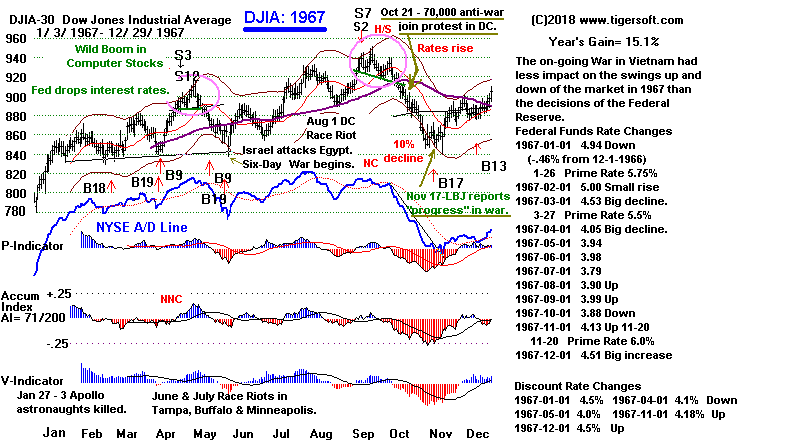
1967-1968
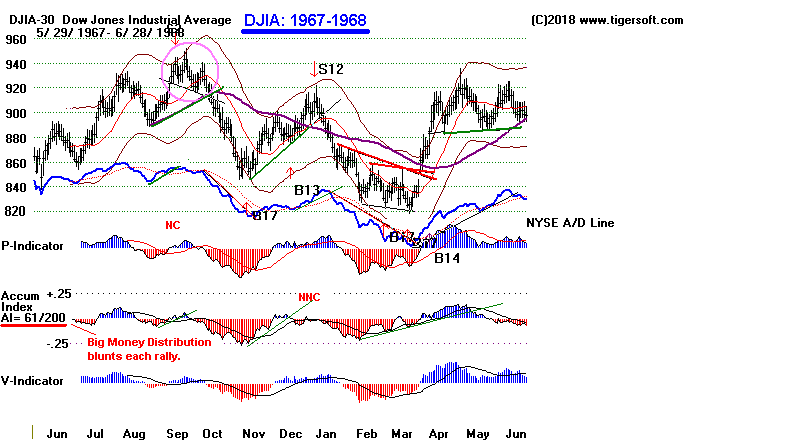
1968
January 17
January 30 – Vietnam War: The Tet Offensive
begins as Viet Cong
forces launch a series of surprise attacks across South Vietnam.
anuary 31
April 4
April 23–30
– Vietnam War:
Columbia University protests of 1968
– Student protesters at Columbia University in New York City take over
administration buildings and shut down the university.
August 20–21
– Warsaw Pact invasion of Czechoslovakia:
The 'Prague
Spring' of political liberalization ends, as 750,000 Warsaw Pact
troops and 6,500 tanks with
800 aircraft invade Czechoslovakia, the largest military operation in Europe since
the end of World War II.
August 22–30
– Police clash with anti-war protesters in Chicago outside the 1968 Democratic National Convention, which
nominates Hubert
Humphrey for U.S. president and Edmund Muskie for vice president. The riots and subsequent
trials are an essential part of the activism of the Youth International Party.
August 28 – John Gordon Mein, U.S. Ambassador to Guatemala, is
assassinated on the streets of Guatemala City, the first U.S. Ambassador assassinated in the
line of duty.
September 13
September 30 – Boeing
introduces its largest passenger aircraft up to that time, the Boeing 747 at a
public event at Paine Field, near Everett,
Washington.
October 2 – Tlatelolco massacre: A student demonstration ends in
bloodbath at La Plaza de las Tres Culturas in Tlatelolco, Mexico City, Mexico, 10 days before the
inauguration of the 1968 Summer Olympics. 300-400 are estimated to have been
killed.
October 8 – Vietnam War – Operation
Sealords: United States and South Vietnamese forces launch a new operation in the Mekong Delta.
October 14 – Vietnam War: The United States Department of Defense
announces that the United States Army and United States Marines will send about 24,000 troops back
to Vietnam for
involuntary second tours.
October 16
October 31 – Vietnam War: Citing progress in the Paris peace talks, U.S.
President Lyndon B. Johnson announces to the nation that he has
ordered a complete cessation of "all air, naval, and artillery bombardment of North Vietnam"
effective November 1.
November 5
November 14 – Yale University announces it is going to admit women.
November 20 – The Farmington Mine disaster in Farmington, West
Virginia, kills seventy-eight men.
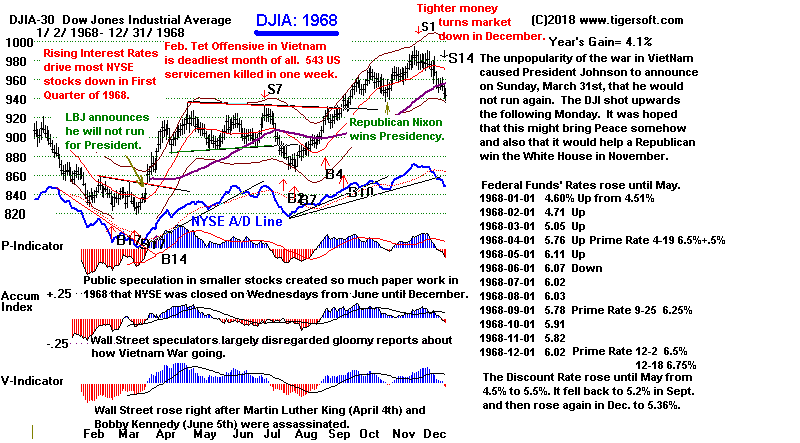
1968-1969
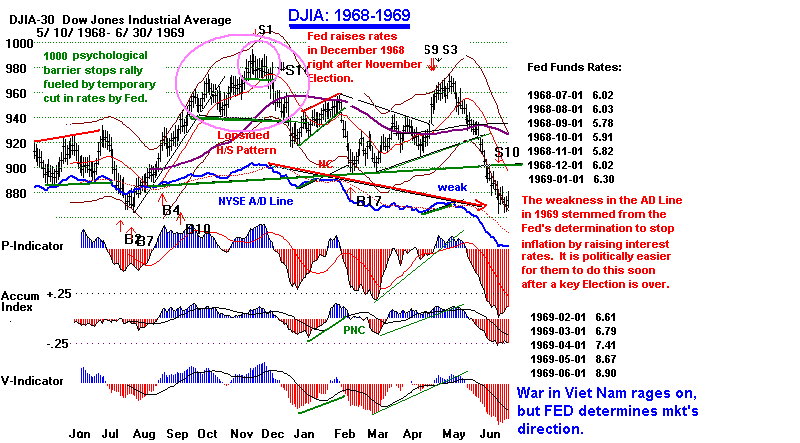
1969
January 28 – 1969 Santa Barbara oil spill: A blowout on Union
Oil's Platform A spills 80,000 to 100,000 barrels of crude oil into a channel and onto
the beaches of Santa Barbara County in Southern
California; on February 5 the oil spill closes Santa Barbara's harbor. The incident inspires Wisconsin Senator
Gaylord
Nelson to organize the first Earth Day in 1970.
February 13 – Front de libération du Québec (FLQ)
terrorists bomb the Montreal Stock Exchange.
March 2 - Soviet
and Chinese forces clash at a border outpost on the Ussuri
River.
March 3 - The United States Navy establishes the Navy Fighter Weapons
School (also known as Top Gun) at Naval Air Station Miramar.
March 18 –
Operation Breakfast, the covert bombing of Cambodia by
U.S. planes, begins.
April 9
May 20 – United States National Guard
helicopters spray skin-stinging powder on anti-war protesters in California.
June 3 – While operating at sea on SEATO maneuvers, the Australian aircraft
carrier HMAS Melbourne accidentally rams and slices into
the American destroyer USS Frank E. Evans in
the South China Sea, killing 74 American seamen.
June 8 – U.S. President Richard Nixon and South Vietnamese
President Nguy?n Van Thi?u meet at Midway Island.
Nixon announces that 25,000 U.S. troops will be withdrawn by September.
June 18–22
– The National Convention of the Students for a Democratic Society, held in Chicago, collapses and
the Weatherman faction seizes control of the SDS National
Office. Thereafter, any activity run from the National Office or bearing the name of SDS
is Weatherman-controlled.
June 24 -
Vivian Strong, a 14-year old African-American girl, is shot and killed by a white
police officer in Omaha, Nebraska, leading to three days of riots in the city.
July 16 – Apollo program: Apollo 11 (Buzz Aldrin, Neil Armstrong,
Michael Collins) lifts off from Cape
Kennedy in Florida towards the first manned landing on the Moon.
July 19
Indian prime minister Indira Gandhi takes fourteen largest banks in the country into
public ownership.
July 20
July 25 – Vietnam War: U.S. President Richard Nixon
declares the Nixon
Doctrine, stating that the United States now expects its Asian allies to take care of
their own military defense. This starts the "Vietnamization" of the war.
August 4 – Vietnam War: At the apartment of French intermediary Jean Sainteny
in Paris, U.S. representative Henry Kissinger and North Vietnamese representative Xuan
Thuy begin secret peace negotiations. They eventually fail since the two sides cannot
agree to any terms.
August 13 – Serious border clashes occur between the Soviet Union
and the People's Republic of China.
August 15–18
– The Woodstock
Festival is held near White Lake, New York, featuring some of
the top rock musicians of the era.
aug 21 - Strong violence on demonstration in Prague and Brno, Czechoslovakia. Military
force contra citizens. Prague spring finally beaten.
Sept 2 -
Ho Chi Minh, the president of North Vietnam, dies at the age of 79.
September 5 – Lieutenant William Calley
is charged with six counts of premeditated murder for the 1968 My Lai Massacre deaths of 109 Vietnamese civilians in My Lai,
Vietnam
October 9–12 – Days of Rage: In Chicago, the Illinois National Guard is called in to control
demonstrations involving the radical Weathermen, in connection with the "Chicago Eight" Trial.
Oct 15 -
Vietnam War: Hundreds of thousands of people take part in Moratorium to End the War in Vietnam
demonstrations across the United States.
November 3
November 15
December 4 – Black Panther Party members Fred Hampton
and Mark Clark are shot dead in their sleep during a
raid by 14 Chicago police officers.
Dec-24 - The oil company Phillips Petroleum made the first oil discovery in the Norwegian
sector of North Sea.
